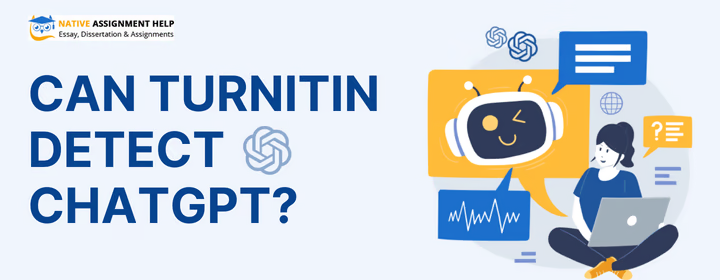Can Turnitin detect AI-written text from ChatGPT?
Yes, all the rumours are true about Turitin'se's ability to detect the use of artificial intelligence tools, such as ChatGpt. Students had felt relief with the rise of Chatgpt and its potential to produce desirable content on any topic in the world. However, this adversely affected a student’s will to research and write content using their skills. This ended the main objective of all written assessments. which is to identify their independent skills, knowledge and sincerity towards their subject and assignment. That is why ChatGpt became a threat to the assessment team of universities.
But tools like Turnitin have also awakened and upgraded by adding the feature of detecting AI. It has come to notice that with this innovation many UK students have stopped using this tool for self benefits, but it also affected a student’s access to useful and authentic information which was otherwise very well provided by ChatGpt.So, the main question is, does it work all the time and how to escape from getting questioned about the uniqueness of your content? By the end of this blog, you will get all your questions answered and a permanent solution for this problem.
What is Turnitin?
Turnitin is an online software which is designed to check the content and track down all the sources from where each part of the content has been taken. It aims to evaluate the amount of uniqueness a person could portray in their content. It is mostly used by universities to assess a student’s academic honesty in their given assignments. Certainly, it is very helpful for the professors as well as the students. They are true to themselves and check personally before submitting to stay away from false accusations.
Features of Turnin ChatGPT Detection
Before diving into Turnitin and its disapproval towards ChatGpt, let’s understand what features it promises.
- Comprehensive Database: This Tool has backup data for almost all the sources that students can use. So when content is taken from other resources, it directly shows the actual sources from where you took the content.
- Detection of Paraphrasing: It can also detect similarities between two different articles if one article has been paraphrased to look like another article. So even if students take the essence from somewhere else and change the sentence formation, it doesn't help much if the professor is using Turnitin.
- Turnitin plagiarism detection: Turnitin has a feature which can quantify the amount of uniqueness and plagiarism there is in any content. The value is shown in the form of percentages by summing up all the plagiarism to present the complete content.
- Shows the presence of Artificial intelligence: This is the latest update in Turnitin in which the complete content is also analysed for the use of OpenAI. Although ChatGpt produces unique content, still it can be differentiated from human-written content.
What is Chat Gpt?
ChatGpt is an AI-operated Chatbot that gives informative responses to all of your queries. It uses natural language processing to respond to users. But that’s not it. There are wonderful pers which not many people are aware of. Let’s have a look at some of them:
- Conversational excellence: Chatgpt gives a response in a conversational tone and responds with an informative answer within seconds.
- Automatic summarisation: You can use ChatGpt to summarise your document and generate key points.
- Advanced-Data Analyses: You can input data that needs to be analysed and get useful points out of it from Chatgpt.
- Get long answers: You can give prompts to make Chatgpt write a complete document for you based on a topic. It can even solve complex math problems and give detailed explanations.
- Creative and unique responses: If you want a customised response for a creative query, Chatgtpt does that for you. You can even get alternative answers as per your requirements.
All these wonderful features come as very useful in writing unique assignments. That’s why students find ChatGpt a delightful pursuit.
Difference between Human Written Content And Chat GPT Content
Students might think that the content given by Chatgpt is very similar to human-generated content. But that isn’t the case. Many professionals and Turnitin can distinguish between these two adhering to the following characteristical differences.
| Human Written Content | Chat GPT Content |
| Humans write using emotional values and engagement with the audience. | No emotional value or audience engagement is displayed in AI content. |
| Writes and matches with every personal requirement of the user. | Cannot be customised according to human needs |
| The tone is adjusted according to what type of content is written | Usually formal tone is used |
| Every information is connected and there is a flow of content | The content isn't glued together and lacks a flow in the context. |
| Any piece of information is mentioned after deep analysis and research. | It included information from the backup data provided by humans. |
| Humans always write unique, insightful and personalised content. | It does not always guarantee to provide unique or different content. |
Why Do Students Use ChatGpt?
The main question that even professors wonder is why students even feel the need to use ChatGpt in the first place. But many valid reasons need to be taken into account and the solution to end dishonesty comes from the student's side. These reasons are as follows:
- Competition To Score Best: There’s a hoard among students to be better than others. If one student is using Chatgpt, others fall under the same trap to reach as high as them if they are lucky enough to ditch Turnitin. The competition is so fast-paced that they are not able to foresee the bad consequences.
- Poor Research Skills: All students want content which is different from regular information. Because students don't excel in finding such through high-quality research, they find unique and different content through Chat GPT.
- They want to save time: Finding and writing accurate and relatable content is surely time-consuming. Students don't get time, especially with all lectures and homework. Using ChatGPT seems very easy and quick for students.
- Poor Writing Skills: Students lack the skills which are required to write the best content. Students think that the content given by Chatgpt is of high quality and can be used to collect high grades.
- They badly want unique Content: It’s a special guideline given by all UK universities to only give unique content, otherwise, it isn't acceptable. Many students are under the impression that ChatGPT is 100 % unique which might or might not be true.
- Financial Issues: Using this tool comes off as cheap to students. However, there are many affordable assignment help websites that can be very good options for their academic investment as they protect from getting rejected assignments at all costs.
Does Turnitin detect text generated by ChatGPT 100% accurate?
No, Turnitin does not detect text generated by ChatGPT 100% accurately. This is because it is not yet proven that Turnitin can detect the presence of content derived from Chatgpt. Research is still going on to ensure complete accuracy in detecting what’s taken from Chatgpt and what’s human written. Many reports have shown that human efforts have also been detected as Artificially written which can cause of lot of academic pressure if not fixed right away. Other than that, it usually shows perfect results but can improve a lot in future.
Consequences of Using ChatGpt for Content Creation
Tools like ChatGpt were created for the betterment of human life by making advanced knowledge reachable to everyone. But somehow not all students are using it for learning and crossing the boundary that is meant to safeguard their willingness to learn independently. All of these have led to the following consequences:
- Assignment Get Rejected: As soon as even a small amount of AI is detected, it is disapproved by professors ending with rejected assignments. This is almost every student’s nightmare after putting in so much effort and time.
- Trust is Broken: When students are caught using AI, it creates a really bad impression on professors and makes it hard for them to trust you for other work. Even if you choose a self-written path afterwards it isn't as effective. So you must choose wisely.
- Bad Remark in Resume: Getting one assignment marked as rejected also affects your record or portfolio. Interviewers look deep into your records and finding this can build second thoughts in their selection criteria.
- PromotesToo Much Dependency: When students are writing assignments without help, they research, write, and improve on their own. But using Chatgpt robs them of this learning opportunity and makes them completely dependent on this generative pre-trained transformer chatbot.
- Partially in checking: Professors intend to assess a student’s skills and give marks for their assignments. Using Chatgpt produces content which is not at all written by students, hence loopholes occur in analysing a student’s performance.
Native Assignment Help: Best Solutions To Defeat Turnitin
If individual efforts are not enough and using AI is not allowed we need a solution, a help that can be relied upon. We thereby present you with professional academic assistance from experts whom you can trust to deliver you unique content every time you place an order. Plus it's so much better and righteous than using Chatgpt. The quality is also better with as many customisations as you want. Everything is at affordable prices.
Here are some of the questions when students say Native Assignment help
- Can Turnitin detect AI-written text from Chat GPT?
- Does Turnitin detect text generated by Chat GPT?
- How does Turnitin detect AI-generated content like Chat GPT?
- Can Chat GPT avoid Turnitin detection?
- Is Chat GPT safe to use with Turnitin?
- Can Turnitin detect content generated by Chat GPT?
- Does Turnitin flag Chat GPT-generated essays?
- Can Turnitin identify Chat GPT content?
- Does Turnitin catch AI-generated content from Chat GPT?
- Will Turnitin detect Chat GPT-written assignments?
The Answer: Turnitin's ability to detect AI-generated text, including content from ChatGPT, is primarily based on its algorithms that analyze text for originality and similarity to existing sources. While it may flag submissions that closely resemble other works, it does not specifically target AI-generated content. Using ChatGPT responsibly—for brainstorming or drafting—can help maintain academic integrity, but relying solely on it for assignments is not advisable. Ultimately, students should ensure their submissions reflect their own understanding and voice.




